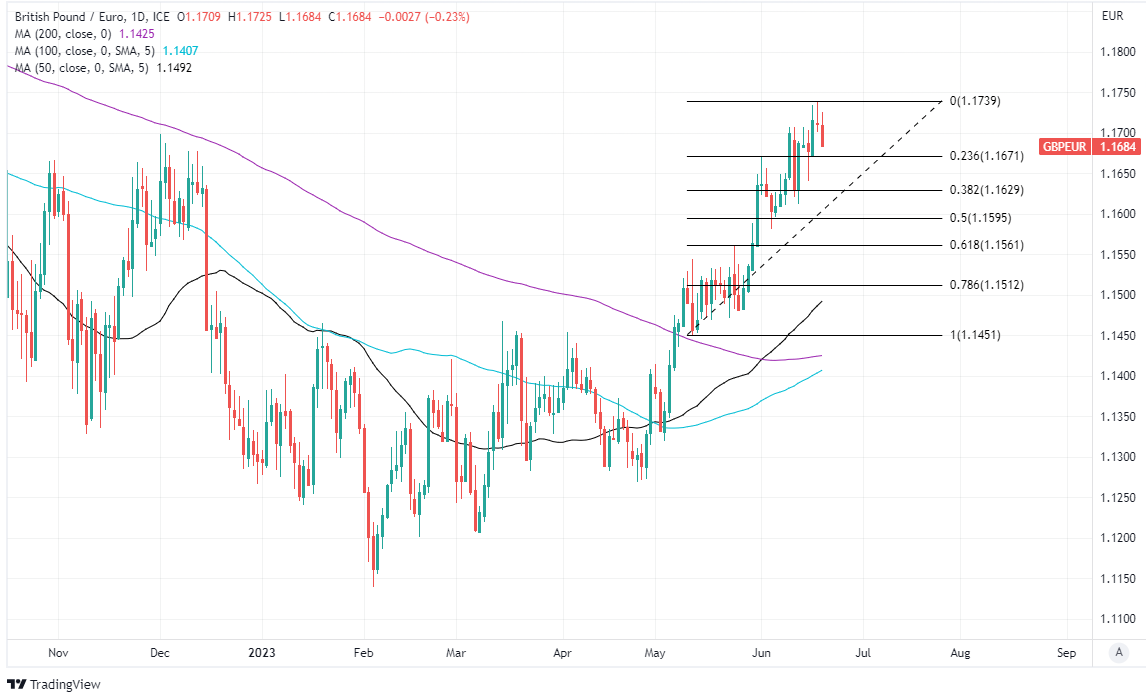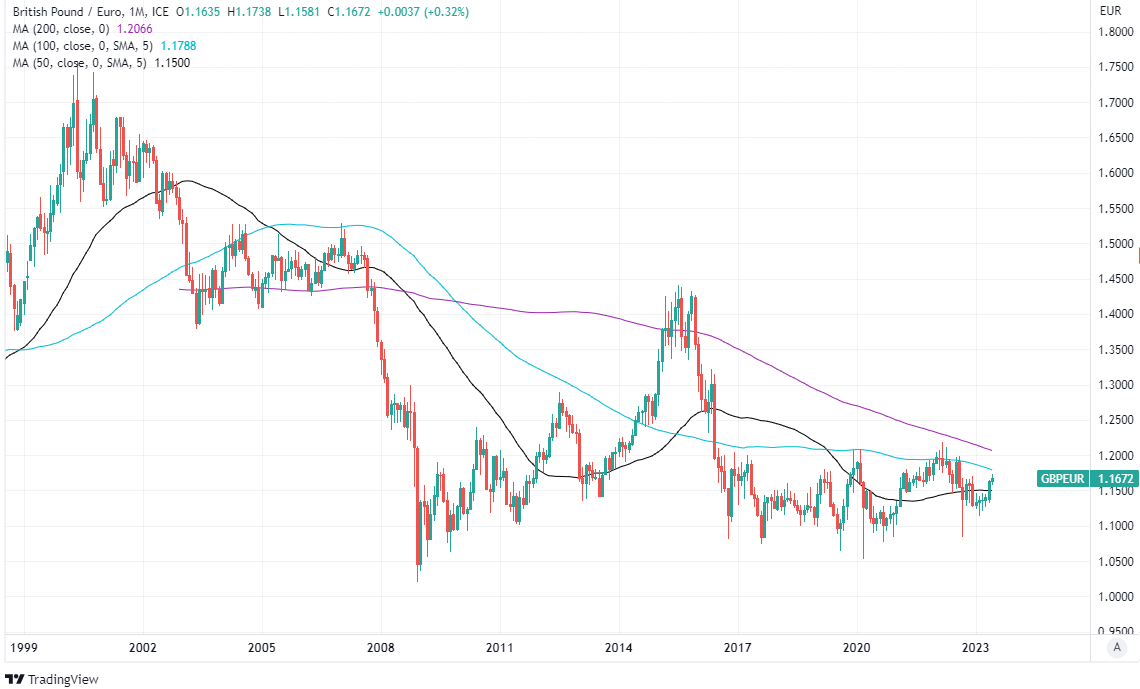GBP/EUR Rate Slips Below 1.17 as Summer Rains Ahead of Solstice
- Written by: James Skinner
"The interest rate shock for mortgages and UK public interest expenses (the average duration of UK Gilts is 13.7y) cannot be underestimated in the medium term and could at some point turn against the currency" - Societe Generale.

Image © Adobe Images
The Pound to Euro exchange rate slipped below 1.17 ahead of the midweek trading session in a partial retracement of gains made since last month's Bank of England (BoE) interest rate decision but with the summer skies raining in advance of the solstice and another policy decision still to come, it's anybody's guess where Sterling goes next.
Sterling exchange rates were a mixed picture on Tuesday and in keeping with the weather in the United Kingdom where there was heavy rain in parts followed by overcast conditions in advance of the summer solstice and the annual celebrations of it taking place from the evening hours.
Stock markets were lower both in the UK and across the world while rising government bond markets led borrowing costs to fall ahead of Thursday's Bank of England event in which the Monetary Policy Committee is set to make a difficult decision over how much further to go in order to ensure that inflation eventually returns to its target.
"Markets have repriced the BoE much higher. Given the UK supply constraints, the stronger activity data has meant an even tighter labour market, stronger-than-expected inflation (with core inflation yet to peak), and perhaps modestly deanchored inflation expectations," says Agne Stengeryte, an economist at BofA Global Research.
"Our economists expect three more 25bp rate hikes with upside risks from the BoE, but markets are currently pricing another five hikes from here," Stengeryte adds.
Above: Pound to Euro exchange rate shown at daily intervals with Fibonacci retracements of May rally indicating possible areas of technical support for Sterling. Includes selected moving averages.
Compare Currency Exchange Rates
Find out how much you could save on your international transfer
Estimated saving compared to high street banks:
£2,500.00
Free • No obligation • Takes 2 minutes
Monetary Policy Committee members have raised interest rates by a total of 440 basis points or 4.4% since December 2021 in order to contain the inflation surge whipped up supply and demand imbalances in the wake of the pandemic and the commodity price rallies of the post-pandemic period.
So far inflation has fallen from its peak of 11.1% in September 2022 having reached 8.7% in April and economist surveys suggest there is a consensus looking for it to edge lower again to reach 8.4% for the month of May when the latest data is out on Wednesday.
But it's the core inflation rate that BoE policymakers may be most interested in for its setting aside of food, energy and other items when measuring inflation, with the difference taken to be the better reflection of the domestic inflation trends the BoE is looking to manage with its interest rate policy.
"The seven-year anniversary of the Brexit referendum is just three days away, but EUR/GBP is still trading seven big figures, or 7.5%, above the 2016 level. The weak currency only explains a fraction of the UK troubles," writes Kenneth Broux, a strategist at Societe Generale, in a Tuesday market commentary.
"The interest rate shock for mortgages and UK public interest expenses (the average duration of UK Gilts is 13.7y) cannot be underestimated in the medium term and could at some point turn against the currency," he and colleagues add.
Above: Pound to Euro exchange rate shown at monthly intervals.
Compare Currency Exchange Rates
Find out how much you could save on your international transfer
Estimated saving compared to high street banks:
£2,500.00
Free • No obligation • Takes 2 minutes
The crime of 'Brexit' may or may not have been the message it would appear to have sent to others and the hurt it might or might not have caused in parts of Europe but that doesn't stop British politicians, media pundits and financial market commentators from seeing its influence behind everything wrong or simply not right in the UK.
This is especially the case with British politicians who lack ideas and solutions for real and pressing problems like inflation, which is now said to be at least in part the result of the Brexit referendum having taken place in the UK some seven years ago this week.
Financial market commentators often suggest or state that Bank of England policymakers need to go further and faster with its interest rate than in other comparable economies so as to be sure that inflation does eventually return to the 2% target.
But the government's Mortgage Lending and Administration Return suggests there is another explanation for the inflation now percolating throughout the domestic economy and this is the recent tendency of mortgage borrowers and lenders agreeing to extend the terms of mortgages for affordability or other reasons.
That trend was covered here and here by Pound Sterling Live and has resulted in a situation whereby the Bank of England's increases in Bank Rate have been transmitted into the UK economy in a different way that has been less effective thus far at suppressing consumption and inflation in the domestic economy.






